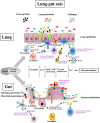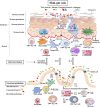Effect of Cigarette Smoke on Gut Microbiota: State of Knowledge
- PMID: 34220536
- PMCID: PMC8245763
- DOI: 10.3389/fphys.2021.673341
Effect of Cigarette Smoke on Gut Microbiota: State of Knowledge
Abstract
Cigarette smoke is a representative source of toxic chemical exposures to humans, and the adverse consequences of cigarette smoking are mediated by its effect on both neuronal and immune-inflammatory systems. Cigarette smoking also is a major risk factor for intestinal disorders, such as Crohn's disease and peptic ulcer. On the other hand, cigarette smoking is protective against developing ulcerative colitis. The effects of cigarette smoking on intestinal disorders include changes in intestinal irrigation and microbiome, increases in permeability of the mucosa, and impaired mucosal immune responses. However, the underlying mechanism linking cigarette smoking with intestinal microbiota dysbiosis is largely unknown. In this communication, we first review the current knowledge about the mechanistic interaction between cigarette smoke and intestinal microbiota dysbiosis, which include the likely actions of nicotine, aldehydes, polycyclic aromatic hydrocarbons, heavy metals, volatile organic compounds and toxic gases, and then reveal the potential mechanisms of the lung-gut cross talk and skin-gut cross talk in regulating the balance of intestinal microbiota and the interrelation of intestinal microbiota dysbiosis and systemic disorders.
Keywords: cigarette smoking; intestinal microbiota dysbiosis; lung–gut axis; skin-gut axis; systemic disorders.
Copyright © 2021 Gui, Yang and Li.
Conflict of interest statement
The authors declare that the research was conducted in the absence of any commercial or financial relationships that could be construed as a potential conflict of interest.
Figures



Similar articles
-
Links Between Inflammatory Bowel Disease and Chronic Obstructive Pulmonary Disease.Front Immunol. 2020 Sep 11;11:2144. doi: 10.3389/fimmu.2020.02144. eCollection 2020. Front Immunol. 2020. PMID: 33042125 Free PMC article. Review.
-
Crosstalk between gut microbiota and lung inflammation in murine toxicity models of respiratory exposure or co-exposure to carbon nanotube particles and cigarette smoke extract.Toxicol Appl Pharmacol. 2022 Jul 15;447:116066. doi: 10.1016/j.taap.2022.116066. Epub 2022 May 18. Toxicol Appl Pharmacol. 2022. PMID: 35595072
-
The Roles of Inflammation, Nutrient Availability and the Commensal Microbiota in Enteric Pathogen Infection.Microbiol Spectr. 2015 Jun;3(3). doi: 10.1128/microbiolspec.MBP-0008-2014. Microbiol Spectr. 2015. PMID: 26185088
-
The regulatory effect of fermented black barley on the gut microbiota and metabolic dysbiosis in mice exposed to cigarette smoke.Food Res Int. 2022 Jul;157:111465. doi: 10.1016/j.foodres.2022.111465. Epub 2022 Jun 6. Food Res Int. 2022. PMID: 35761699
-
Impact of Cigarette Smoking on the Gastrointestinal Tract Inflammation: Opposing Effects in Crohn's Disease and Ulcerative Colitis.Front Immunol. 2018 Jan 30;9:74. doi: 10.3389/fimmu.2018.00074. eCollection 2018. Front Immunol. 2018. PMID: 29441064 Free PMC article. Review.
Cited by
-
Epithelial Barrier Theory: The Role of Exposome, Microbiome, and Barrier Function in Allergic Diseases.Allergy Asthma Immunol Res. 2023 Nov;15(6):705-724. doi: 10.4168/aair.2023.15.6.705. Allergy Asthma Immunol Res. 2023. PMID: 37957791 Free PMC article. Review.
-
Oro-Respiratory Dysbiosis and Its Modulatory Effect on Lung Mucosal Toxicity during Exposure or Co-Exposure to Carbon Nanotubes and Cigarette Smoke.Nanomaterials (Basel). 2024 Feb 4;14(3):314. doi: 10.3390/nano14030314. Nanomaterials (Basel). 2024. PMID: 38334585 Free PMC article.
-
Earth Dreams: Reimagining ARPA for Health of People, Places and Planet.Int J Environ Res Public Health. 2021 Dec 3;18(23):12788. doi: 10.3390/ijerph182312788. Int J Environ Res Public Health. 2021. PMID: 34886514 Free PMC article.
-
Euglena gracilis Extract Protects From Tobacco Smoke Carcinogen-Induced Lung Cancer by Altering Gut Microbiota Metabolome.Integr Cancer Ther. 2023 Jan-Dec;22:15347354231195323. doi: 10.1177/15347354231195323. Integr Cancer Ther. 2023. PMID: 37646331 Free PMC article.
-
Exploring the gut microbiota: lifestyle choices, disease associations, and personal genomics.Front Nutr. 2023 Oct 5;10:1225120. doi: 10.3389/fnut.2023.1225120. eCollection 2023. Front Nutr. 2023. PMID: 37867494 Free PMC article. Review.
References
Publication types
LinkOut - more resources
Full Text Sources

